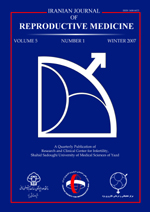
|
International Journal of Reproductive BioMedicine
Research and Clinical Center for Infertility, Shahid Sadoughi University of Medical Sciences of Yazd
ISSN: 1680-6433
EISSN: 1680-6433
Vol. 16, No. 4, 2018, pp. 255-260
|
 Bioline Code: rm18028
Bioline Code: rm18028
Full paper language: English
Document type: Research Article
Document available free of charge
|
|
|
International Journal of Reproductive BioMedicine, Vol. 16, No. 4, 2018, pp. 255-260
| en |
Pregnancy outcome in delayed start antagonist versus microdose flare GnRH agonist protocol in poor responders undergoing IVF/ICSI: An RCT
Davar, Robab; Neghab, Nosrat & Naghshineh, Elham
Abstract
Background: Over the years, many article on different aspects of pathogenesis and
management of poor ovarian responders have been published but there is no clear
guideline for treating themyet.
Objective: This study was designated to compare the effectiveness of a delayed start
protocol with gonadotropin-releasing hormone (GnRH) antagonist and microdose
flare-up GnRH agonist protocol in poor ovarian responders.
Materials and Methods: This randomized clinical trial consisted of 100 poor
ovarian responder women in assisted reproductive technologies cycles. They were
divided randomly in delayed-start antagonist protocol (with estrogen priming
followed by early follicular-phase GnRH antagonist treatment for 7 days before
ovarian stimulation) and microdose flare-up GnRH agonist protocol. The main
outcome was clinical pregnancy rate and second outcome was the number of
retrieved oocytes, mature oocytes, 2PN number, fertilization rate, and implantation
rate.
Results: Fertilization rate, clinical pregnancy rate, and ongoing pregnancy rates
were not significantly different between the two studied protocols. Number of
retrieved oocytes (5.10±3.41 vs. 3.08±2.51) with p=0.002, mature oocytes
(4.32±2.69 vs. 2.34±1.80) with p=0.003, number of 2PN (3.94±1.80 vs. 2.20±1.01)
with p=0.001 and implantation rate (19.40% vs. 10.30%) with p=0.022 were
significantly higher in delayed antagonist group.
Conclusion: The delayed-start protocol can improve ovarian response in poor
responders by stimulating and synchronizing follicle development.
Keywords
Infertility; Assisted reproductive technology; Gonadotropins.
|
| |
© Copyright 2018 - International Journal of Reproductive BioMedicine
Alternative site location: http://www.ijrm.ir
|
|
